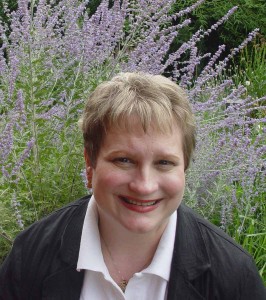[Editor -This post features an interview with Lisa Alzo, genealogy industry presenter at the upcoming #Rootstech conference to be held February 10 to 12, 2011 in Salt Lake City, Utah. Lisa will be presenting four sessions – “Interactive Genealogists Part 1”; “Interactive Genealogists Part 2”; “21st century immigrant clusters” and “Getting More from Google”.]

As an author, speaker and long time genealogist, what sparked your interest in researching your family tree?
My interest in genealogy did not develop in the “typical” way – it was not a burning curiosity, or a death in the family or some other profound event that inspired me. I was studying for my Master of Fine Arts degree at the University Pittsburgh and needed a topic for my thesis. I read the book “Out of This Furnace,” by Thomas Bell, which was published in 1947, and based on Bell’s family–three generations of Slovak men who worked in Andrew Carnegie’s steel mill in Braddock, Pennsylvania. I could relate to the book because my heritage is Slovak and both of my grandfathers worked in the mills in nearby Duquesne, where I was raised. So, I started asking my mother some questions. Unfortunately, like so many genealogists–I started too late. My grandparents had passed away so I had to rely on the information provided by my mother. Thankfully, she knew quite a bit and was a bit of a packrat. She had saved my grandparents’ baptismal certificates and passports, and I was able to use the information to do further research. I decided to write my thesis on my grandmother’s immigration story. That thesis turned into my first book, Three Slovak Women. For this reason, I call myself “The Accidental Genealogist” and have been writing a blog under that name since 2006.
What is your main area of expertise as a genealogist?
Slovak/Eastern European research
Writing Family History
Researching Female and Immigrant ancestors
Do you feel your career choice has contributed to your success as a genealogy educator, speaker and writer?
Absolutely. See answer to question #1. I get to combine the best of both worlds–family history research and writing. What could be better?
Could you give a brief outline of what will be covered in your two presentations entitled, “Interactive Genealogists”, part 1 and 2? Are these talks geared to all levels?
Genealogical research in the 21st century is no longer just a solitary activity performed in the dark corner of a library or courthouse. Technology and the Internet have opened up the world to family history sleuths. The workshop will provide specific tips for genealogists to learn how to make the web work for them through interacting with major genealogy databases and other online sites instead of just passively searching them. Part I will cover interactive components of sites such as Ancestry.com, Footnote, the Ellis Island Database, and others, using Google as a “research assistant” and much more. Part II will be a bit more “hands-on” with a demonstration of how to create a Footnote Page for an ancestor, and how to utilize other tools such as Skype and Second Life for genealogy. The format will also be “interactive” with audience participation strongly encouraged for a discussion style format. While both workshops are open to all levels, it’s strongly encouraged that participants be comfortable with using computers and the internet.
Please tell us more about the talk “21st Century Immigrant clusters”. What will this talk be about and what do you hope the audience will learn from it?
There are a handful of “cluster” immigrant communities throughout the United States that blossomed during the late 19th/early 20th centuries. Exploring “cluster genealogy” can often break down brick walls and help to place our ancestors’ lives in historical context. 21st technology can be used to rebuild “cluster communities” in the virtual world. This session will cover:
- How to identify chain migrations/cluster communities using key records
- Ways to share and collaborate with other researchers
- The shift to “virtual” cluster communities (benefits, pitfalls, and obstacles)
- Using tools such as social networking sites, Wikis, etc. build online genealogical communities
I hope that the audience will learn a new way at looking at genealogical research–from a broader, collaborative community perspective and not just an individual one (what I call the “me” factor), as well as new creative ways to bring the concept of “cluster communities” into the 21st century.
About Lisa Alzo –
Lisa A. Alzo is a freelance writer, instructor, and internationally recognized lecturer, specializing in Slovak/Eastern European genealogical research, writing your family history, and using the Internet to trace female and immigrant ancestors. She is the author of nine books and numerous magazine articles. Lisa also writes the “The Accidental Genealogist” blog http://www.theaccidentalgenealogist.com. For more information see www.lisaalzo.com.
[Editor -Thank you to Lisa for her interview. ==> Register today to attend RootsTech 2011.]
—–
Disclosure: I have been designated as a RootsTech Official Blogger which entitles me to free registration and other perks. Follow this blog and Twitter for updates live from the conference.